When it comes to gaslighting tactics. There are different types of gaslighting, phases of gaslighting, and most importantly the most common gaslighting phrases used to bring someone down.
Have you ever had a conversation with someone that makes you question what’s real? And I’m not talking about a spiritual conversation or any sort of cosmic connection. What I’m talking about is gaslighting.
I’m about to break down the two types of gaslighting, along with the phases of gaslighting and the common phrases that you might hear. And at the end, I’m going to share my number one tip for dealing with gaslighting at the moment, because really, there’s only one thing you can do that’s going to have any impact.
Gaslighting is kind of like an umbrella term because it can be so many things, it can come in so many forms. And at times it could feel almost like the shapeshifter of emotional abuse terminology.
The common thread among all gaslighting tactics is that they make you question your reality.
I have a video that explains gaslighting pretty well and thoroughly. So if you’re interested in that, if you want to learn more about where the term came from and what it means and have some examples in there, too, I suggest you watch that video.
There are two types of gaslighting, and the first type you may not be as familiar with is interesting because it’s probably the more common type.
Related: Gaslighting in Relationships: 7 Questions To Tell If You’re Being Manipulated
Types Of Gaslighting
i. Unintentional Gaslighting
I’m going to give you an example so you understand what I’m talking about. Think about the child who scrapes his knee and it’s the worst pain he has ever felt in his life because, well, he hasn’t lived very long yet.
And then there’s the parent who with good intentions tries to teach the child, not to overreact. you want your child to be able to handle things right. So the parent might say something like, it doesn’t hurt.
And in doing so, you’re telling the child that what’s real to them is not real.
And this is one that I think we’ve probably all dealt with as children and maybe we’ve done as parents. It’s not done to hurt the child in any way, but it is still a form of gaslighting because it invalidates a child’s feelings and — regardless of intention — that can leave a mark.
The child learns very early on that they may not be able to trust their feelings. Or that they’re overly sensitive if they communicate what they’re feeling.
Sometimes unintentional gaslighting can be done with good intentions or it might just be done just kind of off the cuff, without thinking of how something is going to affect the other person.
You end up feeling like there’s something wrong with you, like, what’s wrong with me? And they’re telling you that you shouldn’t be struggling with this. This is not hard at all.
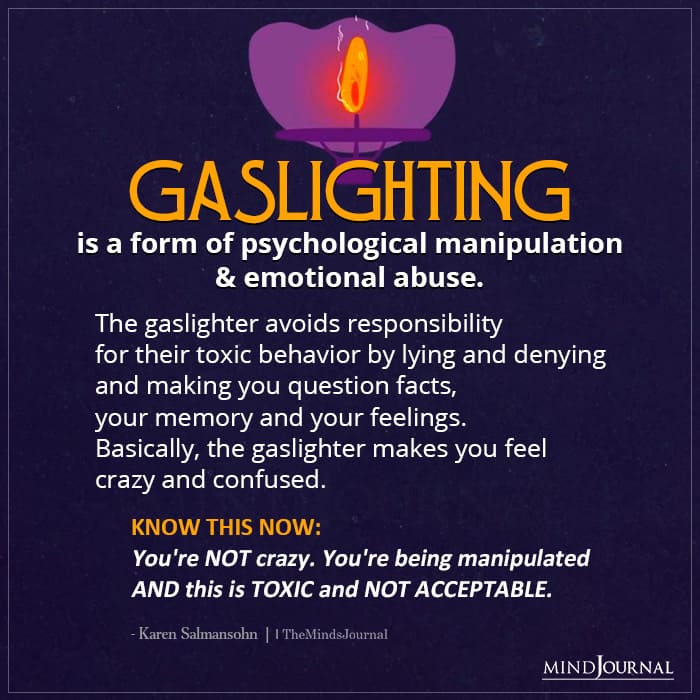
ii. Malicious Gaslighting
The other type of gaslighting is malicious gaslighting, and that is very intentional, although the person might not think, “Let me manipulate this person. I’m going to Gaslight this person.”
The person who’s doing it might not even know really what gaslighting is by definition, but it’s in their nature to manipulate people in situations to their benefit.
So somebody who is emotionally abusive is going to be guilty of malicious gaslighting. And that’s what we talk about most on this channel when we talk about gaslighting.
And that emotionally abusive person may also Gaslight unintentionally. There’s nothing to say that they couldn’t.
But the malicious type of gaslighting is manipulative. It’s trying to get somebody under control or to change their behavior to suit the abuser. So those are the two types, unintentional and malicious gaslighting.
Related: Is It Still Gaslighting If My Partner Has Asperger’s?
Phases of Gaslighting
Now we’re going to talk about the phases of gaslighting. According to psychoanalyst Robin Stern, there are three phases of gaslighting that are present in a relationship with a Gaslighter, with an emotionally abusive person. Those phases are
disbelief
defense
depression
In the disbelief phase, that’s when the gaslighting starts showing up and you’re thinking, well, that must have been unintentional, right?
You know that sometimes people Gaslight unintentionally and you think maybe he didn’t mean it that way or she meant something else.
You make excuses for the thing that person said which made you feel bad at that point. You don’t quite let it question who you are, or you’re still standing firm, but you just don’t believe that that person meant anything by their comments or their behavior.
In the defense stage, you are starting to lose your certainty. You’re starting to take on what the abuser wants you to. You’re starting to believe the gaslighting, but you are still holding on to your defenses. During this phase, we have those conversations where we try to be logical. We try to logic our way around this Gaslighting.
The next phase, depression, is when it starts getting to you.
It starts eating away at your sense of self, at your self-esteem. You become very uncertain and insecure because you have somebody who’s constantly making you question yourself.
You’re not sure if you’re capable of making decisions.
And it’s important to note that these phases can overlap. You can easily flip-flop between disbelief and depression. It’s not necessarily in sequential order, but those are the three phases of gaslighting.
10 Gaslighting Phrases
Okay, so let’s get on to the common phrases of gaslighting. So if you’re reading this post, I think you probably have been gaslighted before -and maybe repeatedly- maybe for months, maybe for years. You probably are going to relate to some if not all of these phrases.
And for each phrase, I’m going to try and give some variations, because even though narcissists are very predictable, they may not use these phrases verbatim, but you can expect to hear some version of these gaslighting phrases.
Here are the ten most common phrases used by gaslighters:
1. You’re Too Sensitive
When gaslighting is present and consistent, it’s usually used to get the person to back down. It could be something like cheating or lying about finances. They’ll take a little kernel of it and say, well, there’s just this little thing and you’re making a big deal out of it, but it is a very big issue.
So the first phrase that gaslighters use and it’s super common is “You’re too sensitive.” Or something like, “Everything bothers you. You make a big deal out of everything”.
And it’s possible people can make big deals out of nothing. And so when you hear that you’re too sensitive, you start thinking about, well, I’m too sensitive compared to who? Am I too sensitive compared to everyone? You start comparing yourself to other people because you’re being told that your feelings are inappropriate.
Related: 10 Clear Signs You Are Being Gaslighted Abused In Your Relationship
2. I never said that
The second common phrase you’ll hear from the Gaslighter is, “I never said that. I don’t recall ever saying that.”
Again, this is one where they get away with it because people sometimes forget things. You’ve forgotten things you’ve said previously, right? It’s believable that somebody would forget something.
But when you’re in an emotionally abusive relationship with somebody who is gaslighting, this is consistent. And it seems almost selective.
It seems like they have a very selective memory – like they’ll remember all these other things. But whenever something comes up around this specific topic it’s, “I don’t remember saying that, or I don’t remember that happening.”
It’s like they have selective amnesia, and that gets you questioning whether you can trust your memory. You think, “Well, maybe I’m remembering it wrong.” And they might even tell you you’re remembering it wrong.
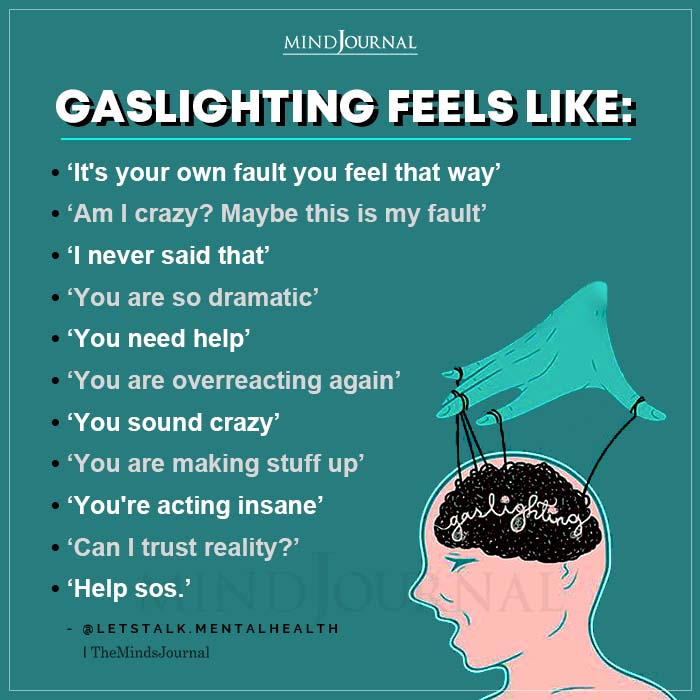
3. I’m not angry
The third common phrase that a Gaslighter will use is, “I’m not angry” when they clearly are angry. This happens a lot with stonewalling and silent treatment. And it could also happen when the abusive person is yelling and getting angrier and angrier.
This form of gaslighting makes you question yourself. I know what I’m seeing, but why are you telling me that it’s wrong?
4. It’s all your fault
The fourth phrase that you will commonly hear from a Gaslighter is “It’s all your fault”. If they get caught with something that they shouldn’t have been doing, it’s going to be your fault.
It’s going to be your fault that they did it. It’s going to be your fault that they cheated.
It’s going to be your fault that they hid something from you because you can’t handle it. If they told you, you wouldn’t be able to handle it. So it’s your fault. I would have been honest if you were more emotionally stable.
5. You’re emotionally unstable
“It’s not your fault you had a rough childhood, but you can’t handle things or you’re emotionally unstable” or they’ll tell you that you’re not whole. It’s a lie. And it benefits them to have you believe that you have issues.
You might also hear that nobody’s going to love you. You’re lucky I put up with you, that sort of thing.
And that reason would be to make you feel insecure, to make you feel like you’re not enough that you have all this stuff. You’ve got all this baggage and you’re not enough on your own.
And I hear this sometimes from people who are victims of emotional abuse, too. And while that is kind of understandable, it’s not something that should be part of any healthy relationship.
Related: 7 Signs You Are a Victim of Gaslighting
6. Nobody likes you
A gaslighter might say, “This is why nobody likes you now, this is why people don’t want to be around you”.
What they’re doing is called triangulation.
They’re saying this other person over here, they don’t like you, and in most cases, it’s not true. But this one is very effective because this uses other people. It’s gaslighting and it operates without other people’s permission or consent.
They’re getting into your head and getting you to think that other people feel the same way that your abuser does. And unfortunately, that can be very powerful. If you’re in a situation like this and if you’re hearing these phrases and you’re hearing them consistently, understand that this is abuse, it’s not you.
7. You’re petty
The 7th common phrase that you will hear from a gaslighter is “You’re petty.”
Even if it’s not a covert narcissist, an overt narcissist can also use covert tactics. They may do something really small that is consistent with their particular brand of abuse. It’s personal to everything that you have told them bothers you, hurts you, or makes you feel bad.
And then you blow up and they sit back and say wow, you’re petty. This tactic is devious because it works, especially if they do it in front of other people. So you end up feeling like the petty one even though it’s the other person who is being petty.
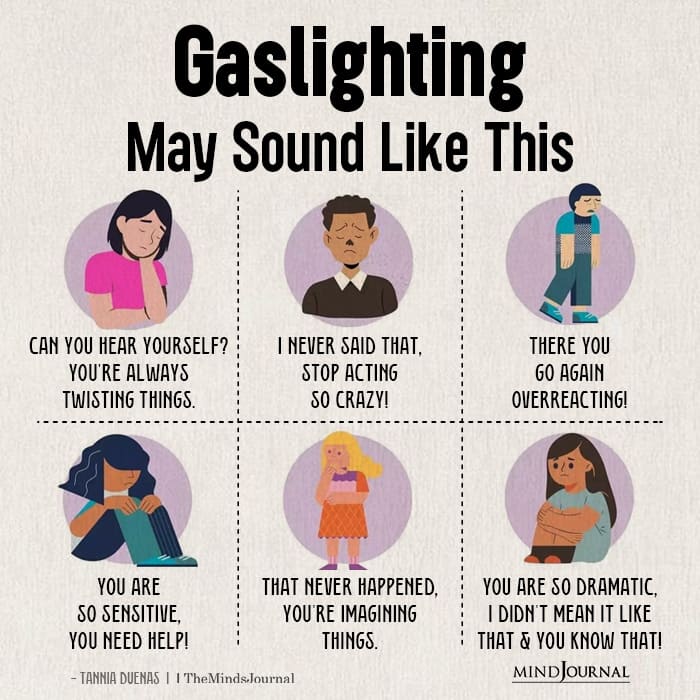
8. You can’t take a joke
The 8th common phrase is “you can’t take a joke.” Emotionally abusive people like Narcissists will often poke fun at you and laugh. And you know, it’s just a joke. You can’t take a joke.
They might have pet names for you that are just downright mean. And maybe you’ve told them, I don’t like when you say that, or I don’t like when you call me that. But they just continue doing it anyway, and they laugh about it even though you never do.
It just keeps going -they keep at it- and they keep telling you that you just can’t take a joke. You’ve got no sense of humor.
9. You’re jealous
Another common phrase that you’ll hear from an emotionally abusive person is “you’re insecure or you’re jealous” — or a combination of both.
And this comes up often because emotionally abusive people are not honest with their partners, and they are often cheaters.
When you’re with somebody like that, things aren’t adding up. You’re constantly questioning the person about things.
Maybe you’ve even found some evidence that they’re denying and it’s easy for them to just say, no, that’s not a problem. You’re the problem. This is fine. Nothing is going on over here. You’re just jealous. You’re insecure.
I had someone tell me with a straight face, you’re jealous and insecure, but don’t worry, it’s not your fault… you’re a woman.
Related: 5 Things That Someone Who Is Gaslighting You Will Say
10. If you loved me…
And the final common phrase I have for you is “If you loved me”. This phrase calls your unconditional love into question. And that’s what makes it gaslighting. So you think you have strong feelings for this person, but they’re telling you that, no, you don’t.
If you don’t do what I want, that means you don’t love me. They’re invalidating your feelings once again.
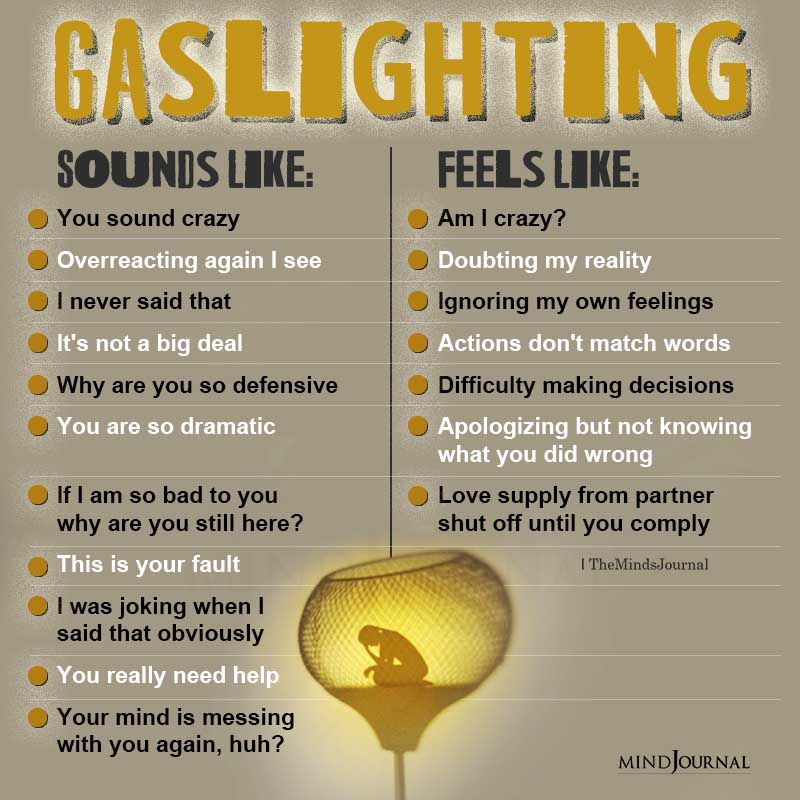
What can you do about a gaslighter?
The number one thing, the only thing you could do in a situation where you’re being gaslighted. If you can identify gaslighting in a conversation, walk away. There’s nothing you can say or do that is going to get this person to own up to whatever it is they’re doing.
It’s not worth arguing at that time if they’re gaslighting you. A relationship with an emotionally abusive person can eat away at your sense of self-worth and security, your happiness.
Written By Common Ego
Originally Appeared On Common Ego
So those are the gaslighting phrases commonly used by toxic people to bring your confidence and self-esteem down. Can you share some more examples of gaslighting phrases and gaslighting tactics? Please comment below!
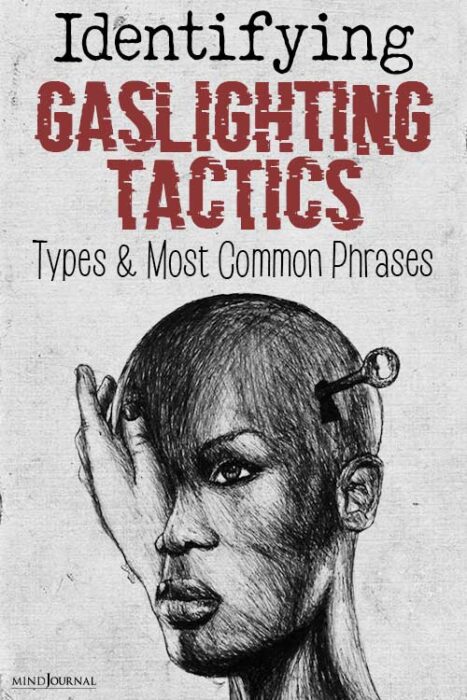
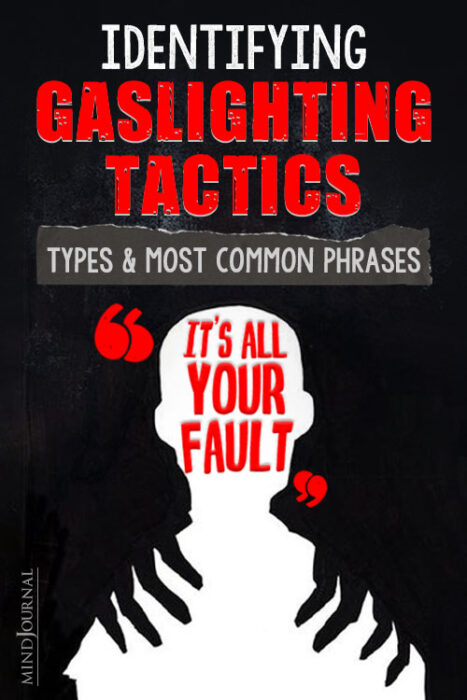
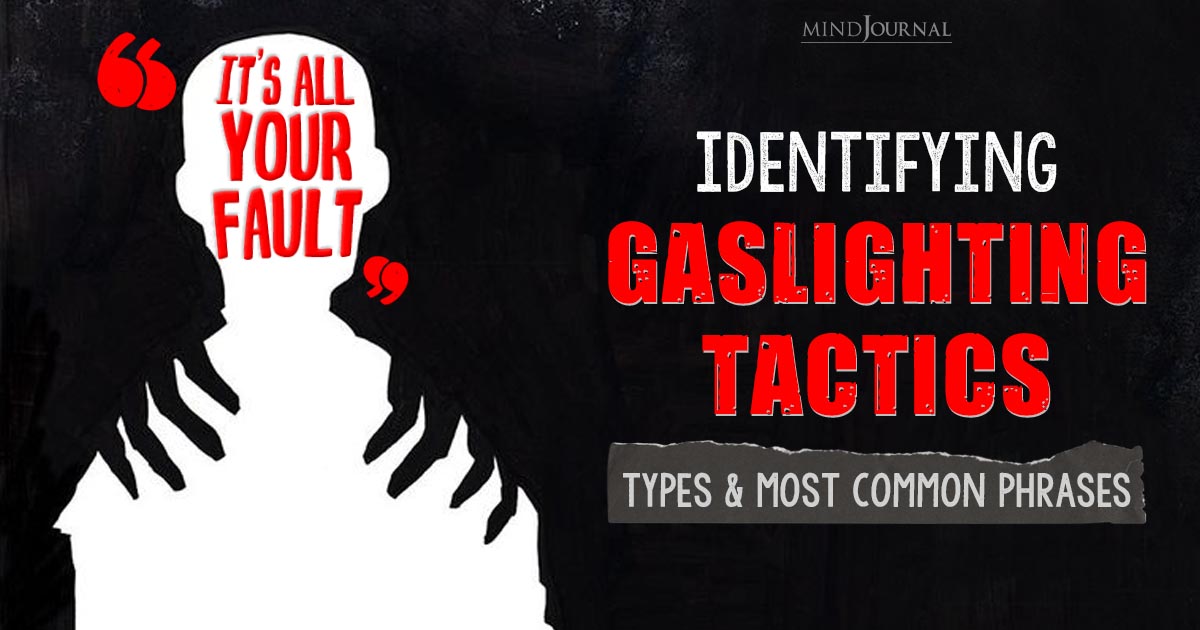







Leave a Reply
You must be logged in to post a comment.